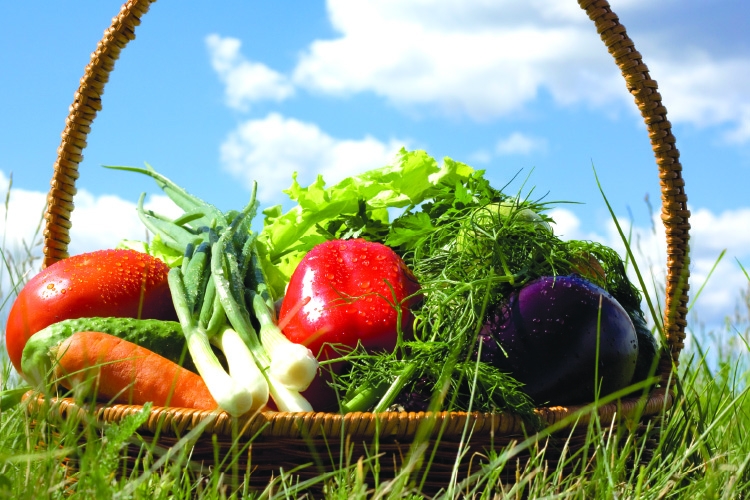To help you change your mindset or even take the giant leap forward in practicing an organic lifestyle, we spoke to a few people who are directly involved in the organic food business. We threw a couple of questions on who makes up their customer base and the one main qualm that has been bugging most of us from living an organic way of life.
Firstly, who are the primary organic food buying customers and has their age base changed over the years?
Elke Wollschon, who runs the Eco Oasis Organic Sanctuary – Restaurant in Bangsar says that her organic restaurant/shop customers come from all walks of life, mostly people above 30 years old, with certain awareness about healthier lifestyle, trying to learn more, or simply to get special organic items that are hard to find elsewhere while Wong Kai Yuen, Owner of EcoGreen Organic Shop & Life Cafe in TTDI says previously his clients were those afflicted with life-threatening illnesses, like Cancer who were compelled to buy organic items as a last resort but now healthy customers are turning to organic as their first line of defense.
As for Clarissa Chong, Marketing Manager of Cottage Farm, an organic home-delivery and wholesaler, her customers are made up of two groups of customers; one, the working mothers group in their 35s to 45s who buy home-delivery packages to be sent to their mothers or in-laws or even babysitters to cook for their children.The second group are those who buy organic home delivery for their parents. Not surprised, she recounts that all her customers are healthy.
On the most pressing question we believe most of us have in our minds – “Is it really that expensive compared to conventional food items?”
Wong of EcoGreen Organic Shop & Life Cafe was rather direct. “It all depends. If customers are complaining about the price, then the issue is with themselves. It means their level of awareness is not deep enough. It’s like comparing a Porsche with a Kancil. Many years ago, a chicken bought at the market was seemingly natural. Nowadays a fully grown chicken is only 30-day old, filled with antibiotics and growth hormones. They should ask how crucial is organic food for themselves.”
But Clarissa of Organic Farm said it best. “All we have to do is compare the current cost and future cost. The time and material used for composting and the manual work that goes into organic farming is nothing compared to conventional farming. It takes time, manual input is tough. Retention rate of workers due to the toughness of the work is also high. As for future cost, consider the medical bills and hospitalisation that may arise if the next generation who have been eating all the vegetables pesticide residues that have been introduced after WW2. For instance, the chemical DDT can pass through generations as our bodies do not know how to get rid of it as reported in CAP. Remember, Cancer cases are increasing every year and young children are already becoming victims.
“In my experience, people who say that just use that as an excuse to not change as change is the most scary thing for most human beings,” said Ella of Eco Oasis. “I observe that people have no problems spending money on big cars or electronic gadgets. So it’s not about the money, but what priorities they set. And if they would be more knowledgeable about how bad the non-organic food really is, more people would shift their focus.”
“The moment people see the truth, it’s not an issue any more. And if you have a smaller budget, you simply choose the most important products of your regular items. Some items are more dangerous to consume non-organic than others!”
So folks, there you have it. Is it time to go organic? You decide. But if you’re in two minds, read how an avid reader of Natural Health, Mai Chi Tran, went organic.
A Whole New World: The Personal Account of Someone Who Decided to go Organic
“You are what you eat. Food does matter!”
This phrase, spoken emphatically by David Wolfe, in the controversial documentary “Foodmatters”, was like the proverbial lightening bolt, forcing a complete rethink of my eating and buying habits.
Prior to this, I’ve always shopped according to price, selecting the cheaper, conventionally produced grocery items. Back then, ‘organic’ was a fuzzy term I associated with ludicrously, expensive goods. In fact, if it hadn’t been for a chance viewing of the ‘Foodmatters’ documentary, I’d probably still be eating ‘cheap’ and be none the wiser with regards to organics.
I absolutely love food and the pleasure of eating. So when I saw “Foodmatters” on the menu of an in-flight entertainment system, I eagerly clicked the PLAY button, my mouth salivating in anticipation of some gastronomical journey. The next 90 minutes of viewing created a fundamental shift in mindset, and marked the start of my self-education and foray into the world of organics.
What started off as a journey into organics, has morphed into evolving lifestyle changes – some imperceptible and others requiring a rewiring of over 35 years of eating habits: from non-organic to organic, from processed foods to whole foods, from cooked to raw. But I’ve a long way yet to go. There have been days where everything goes completely backwards, days that have seen me consuming non-organic, processed, ‘junk’ food…and the body truly feels the effects. It’s about balance, awareness and choice.
I also confess – I’m a selfish human being. If I’m going to do anything outside of my comfort zone, I usually ask myself, “WIFM – What’s In It For Me?” Since I’ve introduced more organic, unprocessed food into my life, I’ve noticed a change in my overall state of health and my appearance. Feeling great, looking good and the warm and fuzzy conscience balm of knowing you’re contributing to the health of the planet far outstrips the question of cost. It is a WIN-WIN-WIN situation: good for me, good for business, and good for the planet.
Many find the cost of organic prohibitive. But then again so are most branded items. There are those who would spend hundreds even thousands on a fashion brand yet scrimp on what goes into nurturing their own bodies. It’s a question of values. To me, my health is my greatest wealth and money spent in that area, is money into my own life bank.
A wise man once said, ‘Knowledge is power’. With knowledge, you’re able to make the right choices for yourself. Ultimately we’re responsible for our own health and in the words of David Wolfe, “You are what you eat!”

















